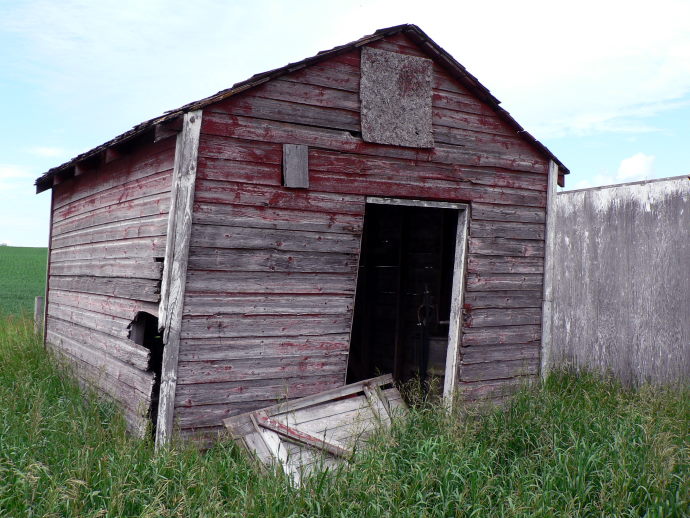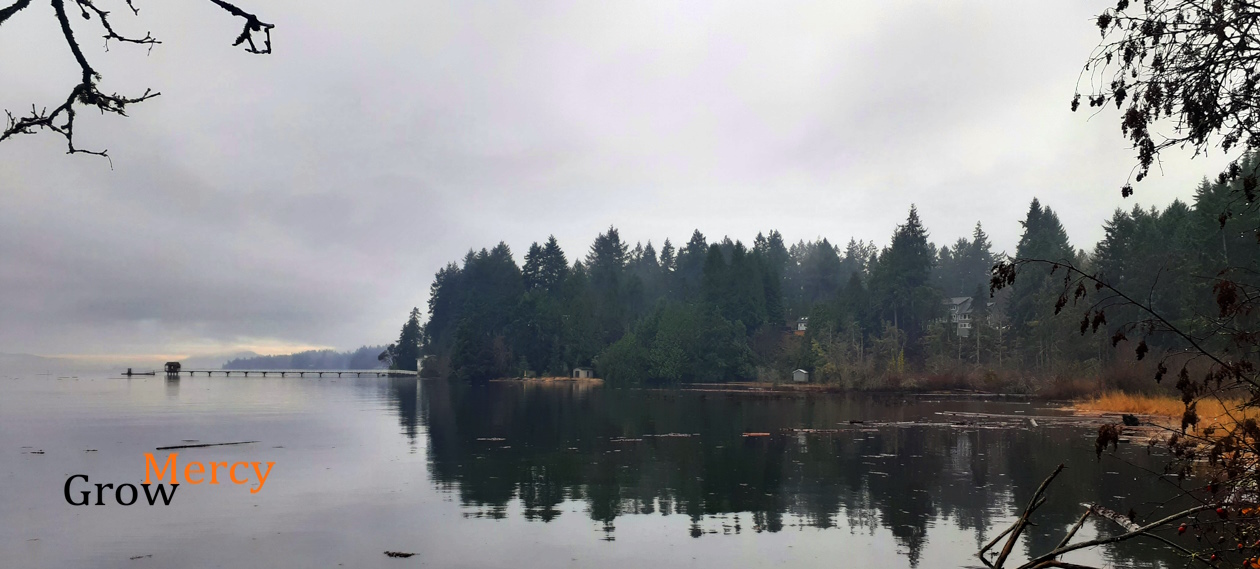
Your family has one too.
A scar carried on the skin of its name.
Fading over time. But never erased.
Discreet, then raised and red
in the allergy of memory.
A public secret, registered,
earnestly brought to the attention of God,
published weekly by the faithfully inquisitive
who attend Baptist prayer meetings in the village.
It was passed down like an unwelcome heirloom,
this portion known as “poor,”
on both fronts, pity and poverty.
The story: my father’s father,
forced off the old land, ran from the “Reds,”
lost all, but saved his family.
The old fate followed him to the new land.
A new form of traitor, a trusted agent,
whose facility with English on paper
stole ten years of work and a full section of good soil.
Landless again, grandfather took shelter from his mind
in a ward for “nervous breakdowns” —
the horizontal dance of the overwhelmed.
My father (not without the strength of grandmother),
carried it. Became provider.
Barely seventeen, yet learned to stand
in such a way as to hold himself up
under the weight of a lack,
greater than many burdens.
Grandfather wandered the ward
searching for his shed, his tools, his tractor,
asking always, “Who can I trust?”
Heard always my father’s answer,
given as taught, “You can trust Christ.”
My father worked away, a hired hand,
then married, happy
with a small patch of land clad in rocks and roots.
“He’s seems better,” said mother one day,
grandmother gone, grandfather now living in a house in town
that smelled of compost and sardines and unsaying silence.
And while he set his table with loss and resentment —
produce from a farm that never was —
he had time, in the end, for his grandchildren;
until the day, gangrenous and unsteady,
my father led him around the pit outside his step
to the car that drove what was left of him
to the city hospital.
But rage and sorrow over betrayal does not leave with death.
It’s soaked up by generations, tilled into the soil,
harrowed over until the rot turns rich,
perhaps to raise a better crop.

So sympathetically written Steve. I recently re-wrote the story of the family, and felt so sorry for your grandfather who came to Canada to begin again only to have it taken away. The sentiment is still there. I never knew him but I too feel the hurt.
– Beth
Thank you so much Beth. Certainly, it was something that changed him, never left him, made him more distant, which could be sensed, even though I was quite young when he died. Thanks again.
Wow, powerful.
Thank you Joyce!
Oh Stephen. “Harrowed over until the rot turns rich.”
I claim this, with tears running down my cheeks, I beg God for this.
Thank you for this Susan!
The rot has turned fertile in Walking a Fence Lime North of Chip Lake published in Beacons Blues and Holy Goats.
Moved to do more productive harrowing.
Many thanks Ray!
Painfully descriptive;
Poetically profound;
Psychologically insightful!
Thank you Ike! That means a lot!
Just when I think your words have reached their mountaintop of finesse – you open another vista and peak to climb -this is a deeply personal yet common narrative of too many over the centuries.
Well done poet extraordinaire
Dear Sheila, thank you so much! You are kind and generous.
I echo Sheila’s words up above this post. Grow Mercy has become essential reading for me, too. This poem delivers fresh ways to consider unspoken truths within a family. And how stirring that a grandson could comprehend an old man’s pain and its consequences so long after the man’s death. Thank you Stephen.
I’m filled with gratitude. Thank you Linda!
“…it is soaked up by generations…” I am wondering, Stephen, as I read the beginning and ending, do you still wrestle with carrying of the weight of the scar? Thank you for the poignancy.
Thank you Ann. Your question: Certainly not consciously. But I’ve been reflecting about generational-familial trauma and I believe, while it doesn’t necessarily precondition us, it does shape us. To what extent? I’m not sure. But we do carry the marks, the scars, somehow. To know this I think is important, important for self-awareness, for insight, perhaps, to why we respond to events in sometimes unexpected ways.
Thank you Steve another brilliantly written poem – moving, thought provoking a tender sharing. This one of intimate wounds that continue to reopen reminds us of how reactions to past pain can mold the behaviour of generations to come.
Thank you ? Thank you ?
Thank you for your own insight Rianne!
Agreed and good to be reminded.
Thanks so much for this, Steve. It’s interesting that you should call it a family scar, and I agree that it is. And I wonder where and how we each carry the scar. Scars of course are a mark both of suffering and of healing, of history and of the way forward. Recalling our family visit to the lost farm when our parents celebrated their 50th anniversary brings surprising tears to my eyes just now. We have inherited a sorrow, and we’ve been shown a way forward. Our grandfather suffered three losses – first in the Bolshevik revolution of 1917, second in the escape to Canada in 1927, and thirdly the farm in 1937. While his third loss broke him, his scarred strength carried on to give, at least this grandson, wonderful memories of laughter with cousins and great food at grandma’s kitchen. I’m left with profound gratitude … and thanks so much for the poem!
“Scars of course are a mark both of suffering and of healing, of history and of the way forward.” Thank you brother. As always, for your wisdom.
What an awesome piece of prose Stephen! There are parts of your piece that reflect some of my family history as well. It strikes me that your Dad and mine had a mountain to climb at a very young age and did a heroic job of managing it all. They did not give in to despair like their Fathers but brought new hope, hard work and fresh opportunity to their children. A heroes medal for them both.
I have struggled over the years with that biblical passage from Numbers that states:
‘The LORD is slow to anger, abounding in love and forgiving sin and rebellion. Yet he does not leave the guilty unpunished; he punishes the children for the sin of the parents to the third and fourth generation.’ (Numbers 14:18)
It is clear to me that it’s not only the sins of the parents that can get passed on to the next generations, but also the injustices experienced by them as well.
Thank you for sharing this Sheldon. We do indeed owe our parents/grandparents gratitude for their heroic and unsung pioneering sacrifices. At the same time it seems we do carry something like the “cell-memory” of their traumas.
Oh. This! And what all the others have said in the comments above. I remain in awe with the way your words can so poignantly reach into our hearts and minds to stir emotions and memories.
With my wings clipped during this pandemic, I find myself thinking back to what my ancestors faced – leaving their homeland and a family across the ocean to find work, grueling jobs in the mines, the Great Depression, and hidden horrors that were hinted at and never fully revealed. I regret all the conversations that I never had with parents and relatives no longer with us, although I am not sure the stories would have been shared. Scars indeed.
Thank you Dianne! And yes! all those possible conversations leave indescribable longings.